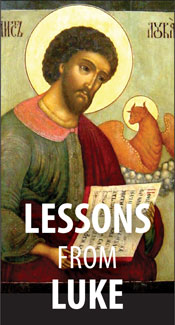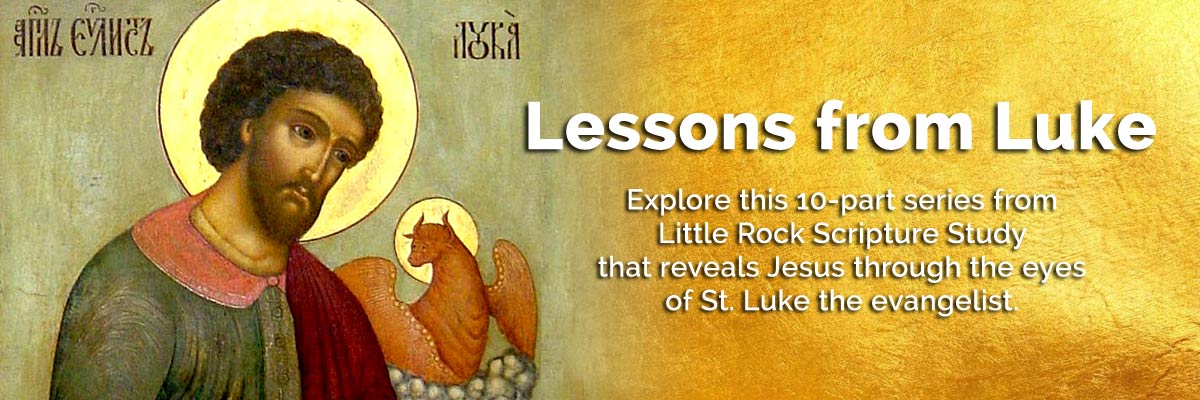Official Website of the
Catholic Diocese of Little Rock
Luke introduces us to Mary
Published: April 13, 2019
This is the third column in a 10-part series.
By Cackie Upchurch
Director of Little Rock Scripture Study
Most of what we know about Mary’s early life comes to us through the first two chapters of the Gospel of Luke. There we are introduced to the angel Gabriel and the promises of God to work in the life of Mary for the salvation of all. We learn of Mary’s pregnancy and the time she spent with Elizabeth. And in these stories we discover that God does extraordinary things through very ordinary people.
 When we meet Mary, she is not yet mature enough to enter into the marriage with Joseph that her parents no doubt arranged for her, as was the custom of the time. She is not known to be particularly learned, nor is she famous before Gabriel arrives on the scene. But she is steeped in her religious tradition and she recognizes that God has sent the angel to her.
When we meet Mary, she is not yet mature enough to enter into the marriage with Joseph that her parents no doubt arranged for her, as was the custom of the time. She is not known to be particularly learned, nor is she famous before Gabriel arrives on the scene. But she is steeped in her religious tradition and she recognizes that God has sent the angel to her.
The New Testament Mary, particularly Luke’s Mary, is not yet cloaked in the many titles assigned to her over the centuries. Nor is she yet the subject of doctrine and dogma. She is, quite simply, a young Jewish virgin who shows us how to say “yes” to God and what that “yes” requires.
Mary’s encounter with Gabriel (1:26-38) becomes a conversation. She somehow expresses her fear and he assures her that God is with her. She expresses her puzzlement, asking how it could happen, and Gabriel invites her to believe that God can conquer seemingly impossible things. He even offers the example of the elder and barren cousin Elizabeth who is pregnant. Mary finally says yes: “I am a handmaid of the Lord. May it be done to me ... .”
It is striking that God does not command that Mary bear Jesus but gives her the wisdom to ponder and ask questions, and the courage to cooperate with God’s plan for her life and for the world.
Saying yes to God requires an ongoing assent to God’s will, and Mary demonstrates this well as she sets out to be with Elizabeth (1:39-45). This time between the two women will be a time of affirmation and mutual encouragement, a time that will come to be associated with the proclamation that we know as the Canticle, or Magnificat, of Mary (1:46-56).
The hymn that Luke records demonstrates just how fully Mary’s life will change as she carries God’s son in her womb, raises him in the tradition of her ancestors, and follows him along the way of the cross that leads ultimately to the resurrection.
Mary’s hymn begins with a focus on what God has done for her, the words being full of gratitude and awe. Quickly, though, the attention shifts to the mercy God has shown throughout the ages for those who are humble, lowly, and poor. Her words echo the words of Isaiah that her son will later proclaim in the synagogue as he begins his public ministry (4:16-21): “The Spirit of the Lord is upon me, because he has anointed me to being glad tidings to the poor … liberty to captives … recovery of sight to the blind … to let the oppressed go free.”
Mary walks the way of discipleship throughout her life, saying yes to God as she raises Jesus, taking him to the temple as an infant and again as a young man. In one early encounter outside the temple, Mary is told by Simeon that her son Jesus will embody the hopes of his people. He will also be a sign of contradiction that will cause her pain: “you yourself a sword will pierce” (2:35). The name Mary is a derivative of Miriam which means “sea of bitterness and sorrow.” The yes she spoke to Gabriel, and ultimately to God, will not be without trials and suffering.
When she was but a young girl herself, Gabriel told Mary that she was favored by God. Mary would recognize that when God showed favor to her ancestors, much was required of them. Noah, Joseph, Moses, Hannah, Samuel, and all the prophets knew that God’s favor was never cheap.
Mary would know that being favored by God is a sure sign that more would be asked than she could imagine, and grace would be given to meet the challenge. We pray for such grace and favor in our lives.
Study Questions
- What are the major influences for your sense of Mary’s identity and purpose? Scripture, music, doctrine, art, devotions or other influences?
- Mary’s “yes” to God is a monumental event in salvation history, opening the way for God’s only Son to enter the world. But it is also a very personal event in Mary’s relationship with God. When have you said “yes” to God not knowing in full detail what it will entail? How did you experience God’s presence with you during that time?
- If you were to write a hymn of praise about how God acts in your life, and in the life of the world, what would you want to include?
- What phrases and events in Luke 1−2 help you to identify with Mary? Why?
This article was originally published in Arkansas Catholic April 13, 2019. Copyright Diocese of Little Rock. All rights reserved. This article may be copied or redistributed with acknowledgement and permission of the publisher.




